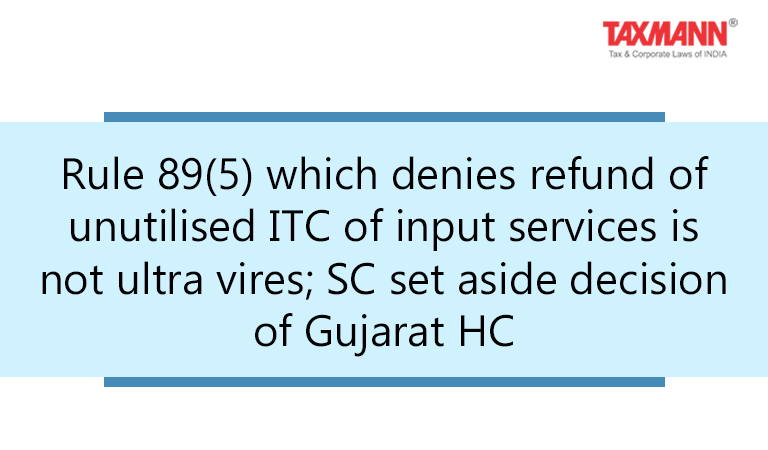Rule 89(5) which denies refund of unutilised ITC of input services is not ultra vires; SC set aside decision of Gujarat HC
- Blog|News|GST & Customs|
- 2 Min Read
- By Taxmann
- |
- Last Updated on 15 September, 2021

Case details: Union of India v. VKC Footsteps India Pvt Ltd. - [2021] 130 taxmann.com 193 (SC)
Judiciary and Counsel Details
-
- Dr. Dhananjaya Y. Chandrachud and M.R. Shah, JJ.
Facts of the Case
The petitioners filed writ petitions before the High Court of Gujarat and the High Court of Madras and challenged the validity of Rule 89(5) which denies refund of unutilised ITC on input services on the ground that it is ultra vires the provisions of Section 54. The Gujarat High Court directed to allow the claim for refund made by the petitioners before it, considering unutilised ITC on input services as part of “Net ITC” for the purpose of calculating refund in terms of Rule 89(5) but the Madras High Court came to a contrary conclusion and upheld validity of Rule 89(5). Therefore, appeal was filed before the Supreme Court due to divergence of views.
Supreme Court Held
The Honorable Supreme Court observed that the purpose of the formula in Rule 89(5) is to give effect to Section 54(3)(ii) which makes a distinction between input goods and input services for grant of refund. The Apex Court also observed that the formula under Rule 89(5) to create a legal bifurcation is a familiar terrain in fiscal legislation including delegated legislation and therefore, the decision of Gujarat High Court was liable to set aside which strike down the Rule 89(5) and upheld the decision of Madras High Court.
However, it was also noted that the practical effect of the formula might result in certain inequities but prescribing an order of utilisation would take this Court down the path of recrafting the formula and walk into the shoes of the executive or the legislature, which is impermissible. Therefore, the Court would strongly urge the GST Council to reconsider the formula and take a policy decision regarding the same.
Disclaimer: The content/information published on the website is only for general information of the user and shall not be construed as legal advice. While the Taxmann has exercised reasonable efforts to ensure the veracity of information/content published, Taxmann shall be under no liability in any manner whatsoever for incorrect information, if any.

Taxmann Publications has a dedicated in-house Research & Editorial Team. This team consists of a team of Chartered Accountants, Company Secretaries, and Lawyers. This team works under the guidance and supervision of editor-in-chief Mr Rakesh Bhargava.
The Research and Editorial Team is responsible for developing reliable and accurate content for the readers. The team follows the six-sigma approach to achieve the benchmark of zero error in its publications and research platforms. The team ensures that the following publication guidelines are thoroughly followed while developing the content:
- The statutory material is obtained only from the authorized and reliable sources
- All the latest developments in the judicial and legislative fields are covered
- Prepare the analytical write-ups on current, controversial, and important issues to help the readers to understand the concept and its implications
- Every content published by Taxmann is complete, accurate and lucid
- All evidence-based statements are supported with proper reference to Section, Circular No., Notification No. or citations
- The golden rules of grammar, style and consistency are thoroughly followed
- Font and size that’s easy to read and remain consistent across all imprint and digital publications are applied



 CA | CS | CMA
CA | CS | CMA
